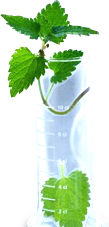



Author(s): S. O. Eze* and C. Q. Kanu
Phytochemical and nutritive analysis including macro- and micro minerals, as well as vitamin composition of a non conventional species of garden egg Solanum aethopicum L. were undertaken using standard methods. The qualitative phytochemical analysis revealed the presence of important bioactive compounds such as alkaloids, flavonoids, saponins, tannins, phenolics and cyanogenic glycosides. The quantitative analysis indicated that S. aethiopicum L. contained alkaloids (5 ± 0.77 %), flavonoids (27 ± 0.45 %) saponins (14 ± 0.23 %), tannins (3 ± 0.14 %), phenols (4.7 ± 0.04 %) and cyanogenic glycosides (3.7 ± 0.29 %). The proximate analysis showed S aethiopicum L. had 6.69 ± 0.02 % moisture, 15 ± 0.02 % ash, 21.33 ± 0.01 % crude fiber, 37.66 ± 0.02 % lipid, 4.2 ± 0.21 % protein and 15.6 ± 0.03 % carbohydrate. The vitamin content revealed high level of vitamins B2 (10.33 ± 0.02 µg/g), B3 (14.34 ± 0.02 µg/g) and vitamin C (406 ± 1.41) mg and trace amounts of vitamin B1 (0.45 ± 0.02 µg/g) and Vit E. (10.53 ± 0.02 µg/g). There were also high mineral contents such as potassium (4250 ± 3.91 mg/g) and trace amounts of other minerals including lead (0.03 ± 0.2 mg/g) and cadmium (0.015 ± 0.002 mg/g). The analyses revealed that S. aethiopicum L. had high beneficial nutrients that justify its use in making stew and sauce as well as its use in place of kola nut as a sign of hospitality in parts of Eastern Nigeria as well as its medicinal uses.